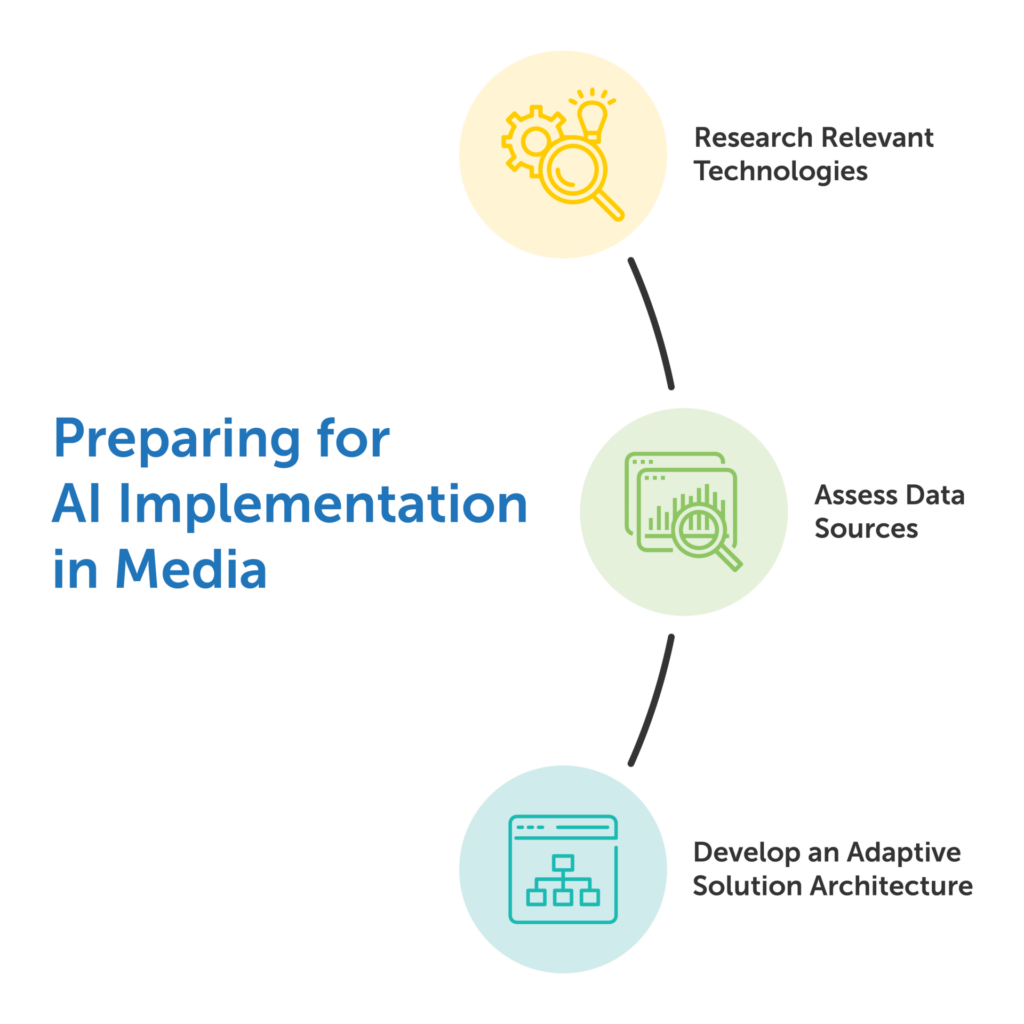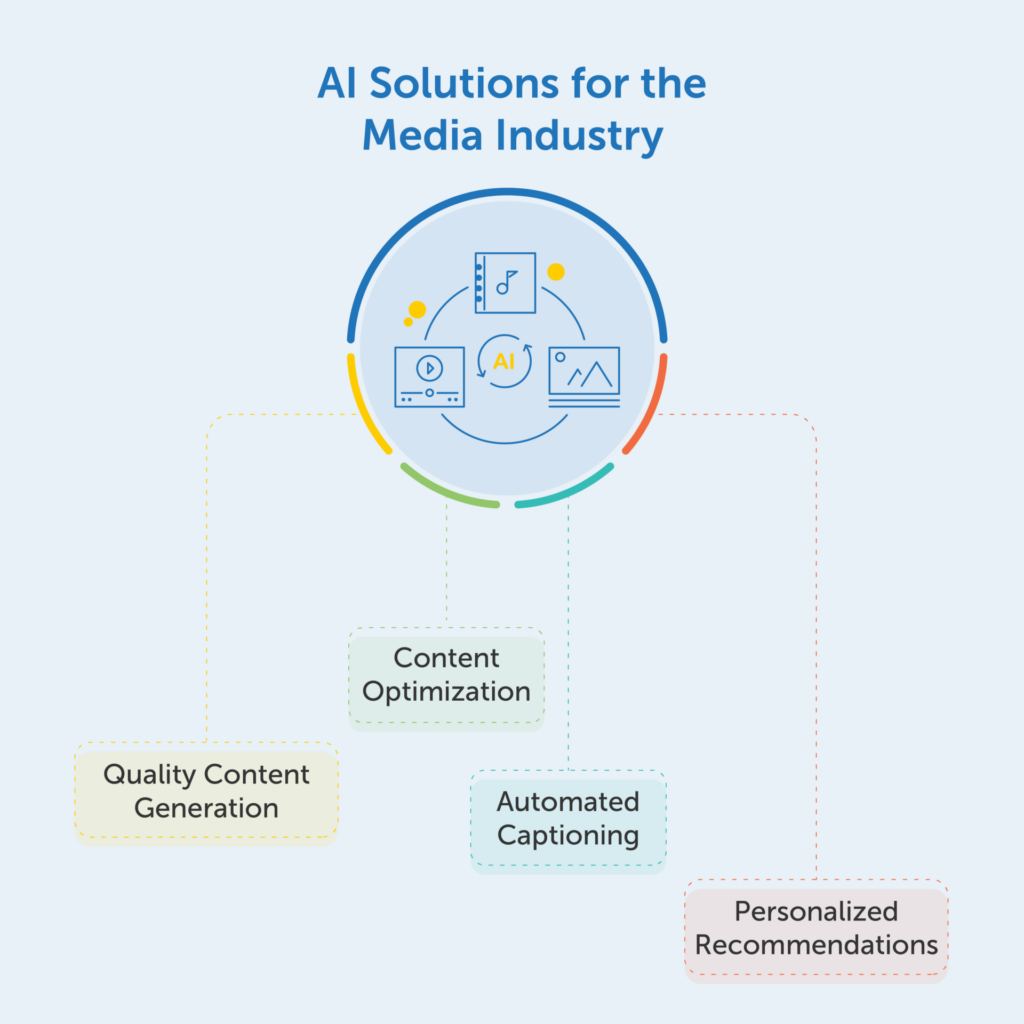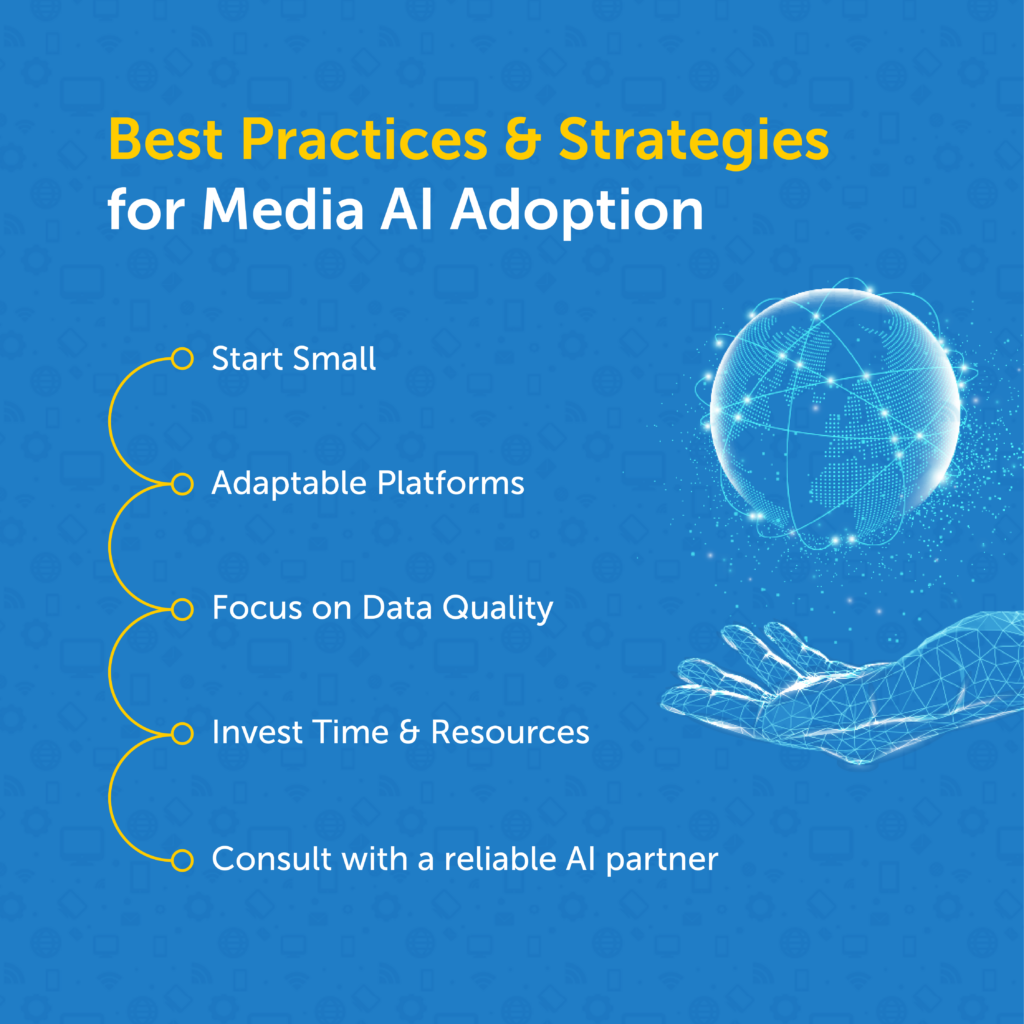
AI technology has revolutionized the media industry. As media moves towards automation and personalization, AI offers a powerful way to get ahead of the competition.
AI solutions for the media sector are evolving. When it comes to AI implementation organizations should shift from considering it as an optional investment to adding it to their critical core business operations. For the media industry, this means a move to a model of smart operations and predictable decision-making.
The goal here is to make sure your business stays ahead of the curve with AI-powered solutions. With the right guidance and strategy, you can use AI to drive innovation and create a unique experience for customers and audiences.
This blog covers everything from recognizing opportunities for AI implementation to creating an effective plan for AI adoption. We also discuss assessing the effectiveness of your AI implementation so that you can adjust your strategy as needed.
Benefits and Opportunities of AI in Media
AI technology in the media industry provides a range of advantages and opportunities, from reducing labor costs to dramatically improving customer experience. According to a survey from PWC, roughly 78% of executives from media organizations agreed that AI would improve their business operations and reduce costs.
We explore how AI is driving digital transformation in the media and entertainment industries in our recent eBook. Download for free here.
AI is increasingly used to improve decision making. AI-driven systems can be used to analyze large amounts of data to identify patterns that help companies identify customer trends and preferences quickly, improving brand loyalty. AI technology can also create more interactive experiences with potential customers by using natural language processing (NLP) to interpret user intentions and deliver contextualized content in both web-based and conversation platforms.
AI implementation in the media industry is a key factor in achieving efficiency and growth goals. With AI-enabled solutions such as natural language processing, computer vision, predictive analytics, automated workflows and customer segmentation, media companies are better equipped to understand customers’ needs and deliver effective solutions that drive higher engagement levels.
Preparing for AI Implementation in Media
Implementing AI in your media business is no small feat, and it’s important to prepare accordingly. Here are a few steps you can take to ensure you’re ready for AI implementation:
Research Relevant Technologies
Before diving in, familiarize yourself with the various AI technologies available, such as Natural Language Processing, Machine Learning and Deep Learning. Understand which ones are suitable for various types of media projects and how they can help accelerate your business outcomes.
Assess Data Sources
Understand which existing data sources you have and potential new ones that may be available. Also assess if there are external data sources such as social media or third-party services that can add value to your project.

Develop an Adaptive Solution Architecture
Lay out a comprehensive architecture for your AI-driven solution that includes automated workflows and MLOps components. This should be done by experienced professionals who have experience working with large datasets and the infrastructure needed to process them effectively.
AI Solutions for the Media Industry
AI offers a range of powerful solutions for the media industry—from data analytics and recommendation systems to automated captioning and content creation. To get the most from AI, media professionals need to define their goals and objectives, then identify the best AI tools for delivering results.
Here are some of the key ways you can use AI in the media industry:
Quality content generation
Automated journalism is a buzzword in the media industry nowadays. It refers to the use of AI and its subsets by journalists and content creators to gather, compose, and distribute content. AI powered algorithms are being used to produce stories at scale and data can be transformed into news with minimal human intervention.
Content Optimization
AI technologies can analyze user engagement data, so you can quickly identify insights into what content resonates with your target audience. This allows you to optimize your content strategy and maximize user engagement on social media platforms, websites and other digital properties.

Personalized Recommendations
Using AI-powered algorithms, you can deliver personalized recommendations tailored to specific audience segments’ interests, tastes and preferences. This helps drive user engagement by providing relevant content likely to inspire them to take action.
Automated Captioning
AI-driven video transcription services save time and money by automatically creating high-quality captions for videos. These services use algorithms to process audio files and generate transcripts that are accurate and consistent with your brand voice.
Best Practices & Strategies for Media AI Adoption
Adopting AI technologies in the media industry can be daunting. Companies need to consider that AI is an ever-evolving field. Strategies and best practices change as we learn more about the technology. Here are some of the best practices and strategies to consider when implementing AI in the media industry.
We explore how AI is driving digital transformation in the media and entertainment industries in our recent eBook. Download for free here
Start Small
Most large-scale projects fail because they try to do too much at once. When beginning your AI project, it’s important to start small and work your way up. Begin with simple tasks such as automation or predictive analytics, then gradually move to more complex use cases as you gain experience.
Adaptable Platforms
AI platforms come with a variety of features that allow users to quickly create and deploy projects with minimal setup. It’s important to choose an adaptable platform that meets your needs and can be scaled as your needs grow.
Focus on Data Quality
Data is the key factor in any successful AI project, so it’s essential to make sure it is accurate, plentiful, reliable, and up-to-date before getting started with development. You need a quality dataset for your models to make accurate predictions and conclusions.

Invest Time & Resources
AI projects require significant investments in both time and resources such as data scientists, software engineers, hardware infrastructure, and more. You need a well thought out plan of action that maps out exactly how each system works together and fits into your overall project strategy.
Consult with a reliable AI partner
Consulting and partnering with the right AI experts helps organizations implement AI-based solutions in the most effective and efficient ways. It also contributes to the improvement of business results for an evolving media landscape. Most importantly you can make decisions based on expertise and data rather than jumping on random tech trends haphazardly.
Power your media enterprise with AI solutions from Fusemachines. Schedule a free conversation today.
Challenges of AI Implementation in Media
Data Collection
One of the major challenges is collecting enough data to enable AI algorithms to make accurate predictions. The more data available, the more accurate the predictions will be. As such, media companies may need to invest heavily in gathering data sets for their AI projects.
Lack of Skilled Workers
Another challenge is finding the right talent with expertise in AI and machine learning. There is a global shortage of skilled workers in this area and it can take time for media companies to find and hire these skilled professionals.
Cost of Implementation
Implementing AI into a media business can be costly due to the technology required and the training of staff involved. It can involve an upfront investment, as well as regular maintenance costs that may not be easily recouped when rolling out a prototype project.
Future of AI in Media Industry
AI usage in the media industry is quickly becoming a must-have, from the smallest production houses to the biggest broadcasting networks. The future of AI in this sector is unlimited. With AI technology, news organizations can analyze large amounts of data quickly and accurately. This could help them develop insightful stories faster than ever before. AI-powered systems could also provide clearer insights into user behavior and identify target audiences for tailored content.
AI can also assist marketing efforts such as advertising campaigns, email marketing, and social media promotions. AI-enabled chatbots can answer customer queries quickly and with better accuracy than humans, reducing customer service costs. As AI becomes more sophisticated, it will be able to manage entire projects from start to finish, including pre-production planning and post-production review.
The possibilities are endless when it comes to AI in the media industry, and companies that don’t adopt this technology soon may find themselves falling behind the competition.
Bottom line
The media industry can benefit from AI implementation by developing better customer experiences, efficiency and improved product offerings. By considering the relevant initiatives in this article, businesses can tailor solutions that not only fit their individual requirements, but also maximize the use of AI to drive revenue and optimize operations.
The importance of AI implementation in the media industry is paramount, and media organizations must continue to adopt solutions that maximize their success in years to come.
We explore how AI is driving digital transformation in the media and entertainment industries in our recent eBook. Download for free here.
Power your media enterprise with AI solutions from Fusemachines. Schedule a free conversation today.


